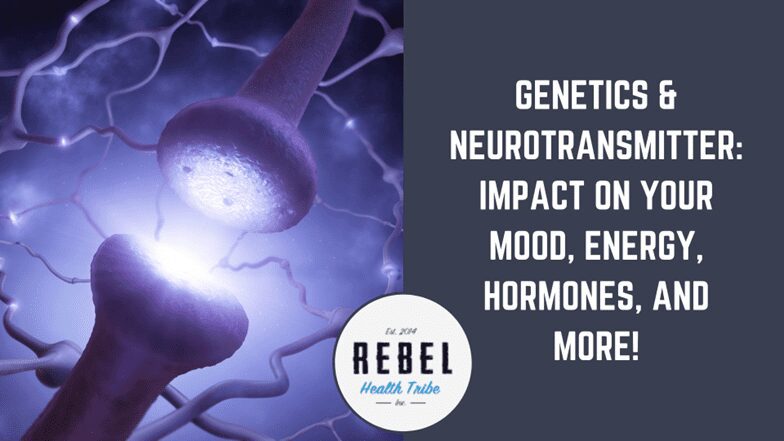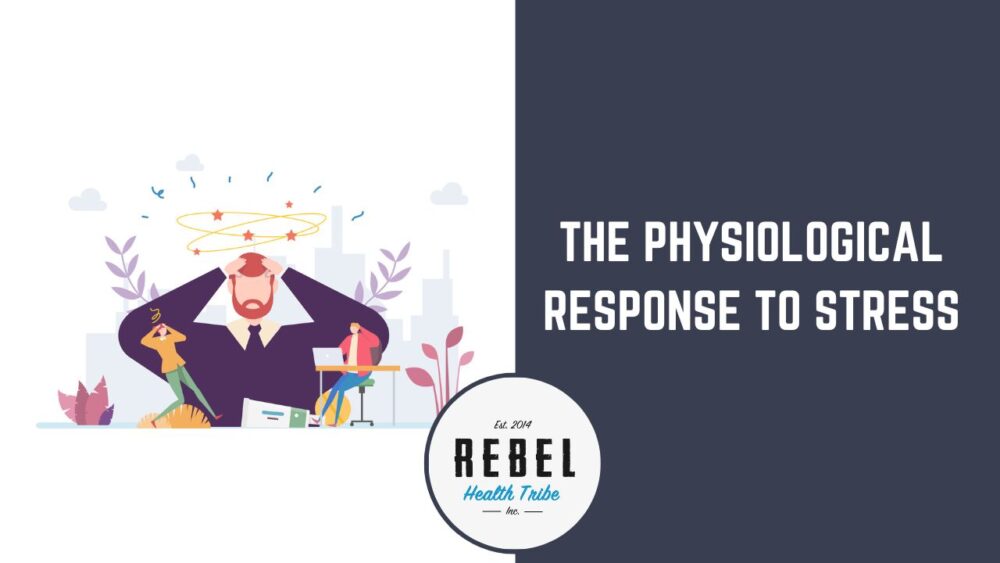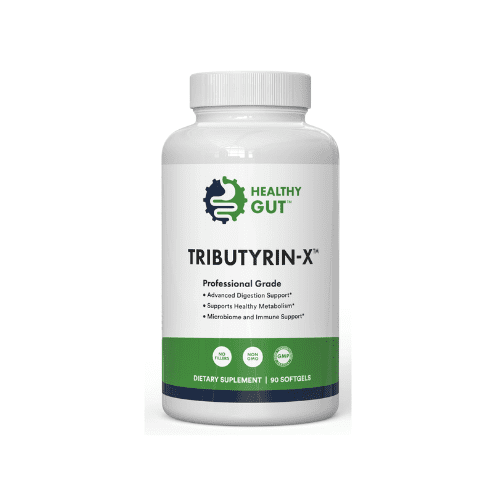Benefits, Sources, and Types of Magnesium
We all know it’s important to get our vitamins and minerals. But some vitamins and minerals may just be a little more important than others. And one mineral of the utmost importance is magnesium.
In this blog post, we’re going to explore why magnesium is so vital to our well-being, the consequences of a deficiency, and why magnesium deficiencies are more common than you might think. And most importantly we’ll dive into the best sources of magnesium and how you can get more of this mighty mineral in your life.
What Is Magnesium?
Magnesium is a type of mineral that is found abundantly in the earth. So, what is magnesium good for when it comes to your health? The answer is – a lot!
Magnesium is an important component of your bones and cellular walls. It helps your cells produce energy and transport important molecules across cell membranes. Magnesium helps your cells communicate with each other and migrate throughout your body. And it serves as a catalyst for countless chemical reactions that your body relies on to function.1
With so many indispensable roles, it’s no surprise that a deficiency in this essential mineral can have some serious consequences.
Consequences of Magnesium Deficiency
An extreme magnesium deficiency can cause serious health concerns like tingling, numbness, muscle cramps, seizures, personality changes, and an abnormal heart rhythm. But a more minor deficiency, also sometimes referred to as a subclinical deficiency, can be much harder to detect and have much less obvious effects.
Subclinical deficiencies can be so challenging to detect and diagnose because magnesium in your bloodstream does not necessarily reflect adequate levels within your cells. Just some of the consequences that have been linked to suboptimal magnesium levels include:2,3,4
- Increased inflammation
- Mood disorders such as depression, anxiety, and ADHD
- Osteoporosis
- Fatigue and weakness
- High blood pressure
- Calcification of blood vessels
- Type 2 diabetes and metabolic syndrome
- Migraine headaches
- Constipation
- Menstrual cramps
- Difficulty sleeping
So what exactly causes these suboptimal magnesium levels?
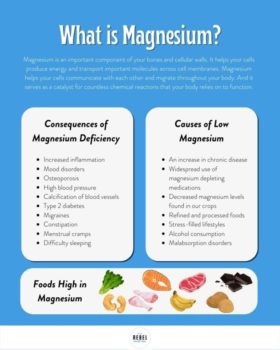
What Causes Suboptimal Magnesium Levels?
Because it’s so difficult to pinpoint magnesium deficiencies, it’s hard to determine just how prevalent magnesium deficiency is. But one thing we do know for sure is that suboptimal magnesium levels are rampant and magnesium deficiency is even being considered a public health crisis.4 So why are we seeing such a spike in people struggling with suboptimal magnesium levels?
It’s likely due to a number of factors – both on an individual level and on a bigger-picture level. Some of the factors that are likely contributing to magnesium deficiencies include:4,5
- An increase in chronic diseases
- Widespread use of magnesium-depleting medications
- A significant decrease in magnesium levels found in our crops thanks to modern agricultural practices
- The widespread availability of refined and processed foods
- An increase in phosphorus and calcium consumption (namely from soft drinks and dairy) that binds to magnesium and increases magnesium requirements
- Hectic, stress-filled lifestyles
- Alcohol consumption
- Malabsorption disorders like inflammatory bowel conditions
Let’s take a little deeper look at the benefits of magnesium and how optimizing your levels can boost your health.
Magnesium for Stress, Sleep, and Muscle Cramps
A hectic, busy life can leave us stressed, tense, and tired. But optimizing magnesium levels can help boost your mental health by combating stress, soothe tense, cramped muscles, and help you slip into a restful night’s sleep. Magnesium accomplishes this in the following ways:
Magnesium for Stress:
When you’re stressed, a number of hormones, neurotransmitters, and signaling molecules are released that shift your body into a “fight or flight” state. Magnesium interacts with all of these stress mediators and can quickly be depleted – making it more difficult for your body to transition out of a stressed state. Replenishing and optimizing your magnesium can help calm your nervous system and minimize your response to stress.6,7
Magnesium for Muscle Relaxation:
Your muscles contain proteins known as actin and myosin that shorten to contract your muscles and lengthen to relax them. Calcium and magnesium work together to control your muscle contractions. When calcium binds to your muscle proteins it stimulates them to contract and when magnesium binds to them, it triggers them to relax.
Insufficient magnesium levels can leave your muscles feeling tense and cause muscle cramps or spasms. But boosting magnesium levels can promote muscle relaxation and prevent painful cramping.8
Magnesium for Sleep:
Does magnesium help you sleep? The answer is yes – magnesium can directly impact the hormones and neurotransmitters that influence sleep. By inhibiting the release of wakeful hormones like cortisol and stimulating the production of sleep-inducing neurotransmitters like GABA, magnesium can have a potent effect on sleep. Studies have found that magnesium supplementation can help you fall asleep faster, sleep longer, and get better quality sleep.9
Magnesium for Gut Health
Magnesium also plays several crucial roles in maintaining a healthy gut including:10,11,12
- Promoting peristalsis: Peristalsis, the wave-like muscle contractions that move food through your digestive tract, relies on magnesium to help regulate muscle movement. Without adequate magnesium, your bowels can slow down and lead to constipation.
- Boosting digestive enzymes: Magnesium serves as a crucial cofactor in hundreds of enzymatic reactions – including those that break down the nutrients you consume.
- Supporting a thriving, diverse microbiome: The microbes that live in your gut are essential to your well-being – we quite literally can’t survive without them. Studies have found that a magnesium deficiency can alter your microbiome and create an imbalance in the good bacteria and harmful bacteria in your gut.
It’s clear that optimizing your magnesium levels is a non-negotiable for overall health. So how can you ensure you’re getting enough of this crucial mineral?
Foods High in Magnesium
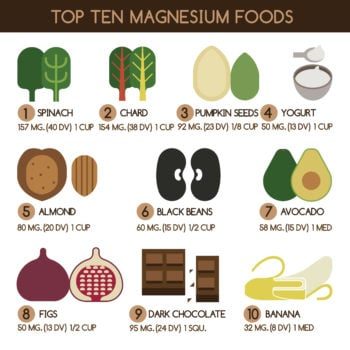
Your diet is one of the core pillars of health. So eating a well-rounded diet that’s full of healthy magnesium-rich foods is a great start when it comes to ensuring you’re getting enough magnesium. Some foods with magnesium include:13
- Dark green leafy vegetables like spinach, kale, chard, etc.
- Nuts like almonds, cashews, peanuts, etc.
- Seeds – namely pumpkin seeds
- Whole grains like brown rice, oatmeal, quinoa, etc.
- Fish
- Poultry
- Beef
- Fruits like bananas and raisins
- Dark chocolate (70% or above)
- White potatoes with skin
While your diet is a good place to start, the truth is, much of our food is actually depleted in magnesium. So a good way to fill in those nutritional gaps is with magnesium supplements. While most people think of supplements in pill form, you can actually also absorb magnesium topically through your skin.
Topical Magnesium Benefits

Topical magnesium, also known as transdermal magnesium, is a form of magnesium that can be absorbed directly through your skin. It can be absorbed topically by using magnesium oil – an emulsion of magnesium chloride salt dissolved in water or skin-nourishing oils. From there, the magnesium is able to penetrate through your skin and be delivered directly to your cells.14
Because topical magnesium bypasses your digestive tract and is delivered directly to your cells, it’s especially important to ensure you’re using magnesium topical spray with high-quality, non-toxic ingredients. Cymbiotika’s Topical Magnesium Oil Spray contains magnesium sourced from the Dead Sea (some of the purest magnesium chloride on the planet) and is combined with all-natural, non-toxic, 100% vegan extracts to create unmatched absorption and safety.
The benefits of topical magnesium are considered identical or superior to those of taking oral magnesium supplements thanks to its ability to penetrate directly into your cells. While topical magnesium is an excellent way to up your magnesium intake, it’s useful to have an understanding of other types of magnesium supplements that are available.
Types of Magnesium Supplements
Magnesium can come in a number of different forms or complexes of magnesium. Let’s take a look at a handful of them:
Magnesium Citrate
Magnesium citrate is magnesium bound to citric acid and is one of the most commonly found forms of magnesium. Mag citrate is also one of the most bioavailable forms of magnesium – meaning it’s easily absorbed by your digestive tract. While magnesium citrate is a great supplement option, the next two forms of magnesium (along with topical magnesium chloride) may have even more magnesium-optimizing properties.
Magnesium Glycinate
Magnesium glycinate is elemental magnesium bound to a type of amino acid known as glycinate. Amino acids are like the building blocks for protein – so your body uses them in growth and repair. Magnesium glycinate is readily absorbed and is thought to have particularly potent calming properties – making it the preferred form of magnesium to soothe anxiety, promote sleep, and support optimal magnesium levels.
Healthy Gut’s brand new Magnesium Glycinate Supplement is one of the only pure magnesium glycinate supplements – no fillers, no binders – nothing but pure high-quality magnesium glycinate.
Magnesium Threonate
Magnesium threonate is formed when magnesium combines with threonic acid – a substance derived from the breakdown of vitamin C. This form of magnesium is readily absorbed and is known for its impressive ability to replenish and increase magnesium levels in brain cells – making it the best form of magnesium for brain health thanks to its ability to:
- Boost your brain power
- Balance your mood
- Calm your nervous system
- Improve your memory
- Combat stress
Cymbiotika’s unique liposomal magnesium l-threonate blend uses liposomal magnesium – magnesium molecules surrounded by phospholipid molecules to aid in transporting magnesium directly into your bloodstream so it can merge with your cells to optimize magnesium delivery. This unmatched delivery makes it a potent way to support overall brain health and mental well-being.
Magnesium Hydroxide
Magnesium hydroxide is probably one of magnesium’s most well-known and commonly encountered forms. Magnesium hydroxide is regularly used as a laxative to treat constipation or as an antacid to address indigestion. It can be found in liquid, tablet, or chewable form under names like Milk of Magnesia.
Magnesium Oxide
Magnesium oxide is magnesium combined with oxygen and is typically not absorbed well in the digestive tract. For that reason, it’s often used as an antacid to treat heartburn rather than as a supplement to increase magnesium levels.
Magnesium Sulfate
A combination of magnesium, sulfur, and oxygen creates magnesium sulfate, or what’s better known as Epsom salts. This salt-like substance doesn’t taste very good but can be taken orally. While it’s more commonly added to baths for sore, achy muscles, studies have found that this form is not nearly as absorbable as the magnesium chloride that’s typically used in topical magnesium oils.
Ready to Experience the Power of This Miraculous Mineral?
While there are a variety of different forms of magnesium, they are not all created equally. To recap, these are our favorite forms of magnesium thanks to their unmatched absorption and potent health-boosting effects:
- Cymbiotika’s Topical Magnesium Oil Spray
- Cymbiotika’s Magnesium Threonate
- Healthy Gut’s Magnesium Glycinate
You can find all of these and more through our online store. And we’ve got loads of resources to help you optimize your well-being and create an abundantly healthy life you love. To access all of these incredible resources, you can head over and check out the blog, our podcast, and the Wellness Vault.
Resources:
- Magnesium | Linus Pauling Institute | Oregon State University
- Review: Subclinical magnesium deficiency: a principal driver of cardiovascular disease and a public health crisis – PMC (nih.gov)
- Magnesium Supplements: Benefits, Deficiency, Dosage, Effects, and More (webmd.com)
- Review: Subclinical magnesium deficiency: a principal driver of cardiovascular disease and a public health crisis – PMC (nih.gov)
- Magnesium | The Nutrition Source | Harvard T.H. Chan School of Public Health
- Magnesium Status and Stress: The Vicious Circle Concept Revisited – PMC (nih.gov)
- Magnesium and stress – Magnesium in the Central Nervous System – NCBI Bookshelf (nih.gov)
- Magnesium and the regulation of muscle contraction – PubMed (nih.gov)
- The effect of magnesium supplementation on primary insomnia in elderly: A double-blind placebo-controlled clinical trial – PMC (nih.gov)
- Dietary Magnesium Deficiency Alters Gut Microbiota and Leads To Depressive-Like Behaviour | Clinical Education
- PHYSIOLOGICAL AND PHARMACOLOGICAL STUDIES OF MAGNESIUM SALTS.—IV. THE RELATIONS OF THE SALTS TO THE PERISTALSIS OF THE GASTROINTESTINAL CANAL | American Journal of Physiology-Legacy Content
- Magnesium – Health Professional Fact Sheet (nih.gov)
- Magnesium | The Nutrition Source | Harvard T.H. Chan School of Public Health
- Effects of transdermal magnesium chloride on quality of life for patients with fibromyalgia: a feasibility study – ScienceDirect












